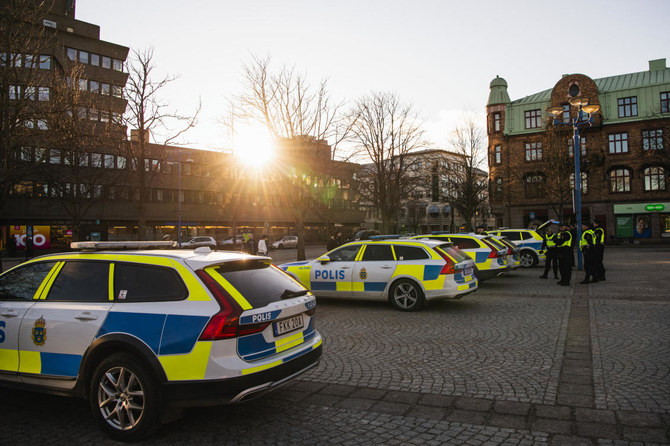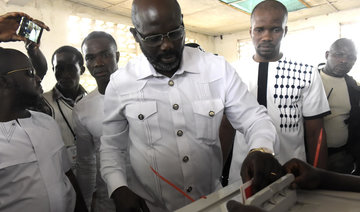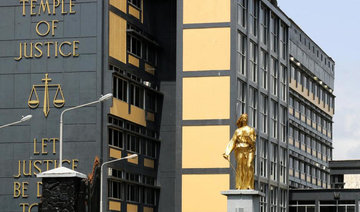MONROVIA: Liberians on Friday feted former football star George Weah’s presidential victory in the country’s first democratic transfer of power in seven decades scarred by civil wars, political assassinations and an Ebola crisis.
Weah, idolized in Liberia as “Mister George,” is set to replace Ellen Johnson Sirleaf, who took over in 2006 at the helm of the west African state founded by freed US slaves. He will be sworn in on Jan. 22.
The 51-year-old starred at top-flight European clubs Paris Saint-Germain and AC Milan in the 1990s, before briefly playing for Chelsea and Manchester City toward the end of his career.
Weah, who entered politics after retiring from football in 2002, easily beat Vice President Joseph Boakai in Thursday’s run-off vote, gaining 60.5 percent of the ballot against 38.5 percent for his rival. Weah won in 14 of Liberia’s 15 counties.
“My fellow Liberians, I deeply feel the emotion of all the nation. I measure the importance and the responsibility of the immense task which I embrace today. Change is on,” Weah said on Twitter.
Congratulations poured in from all quarters. French President Emmanuel Macron hailed the ex-star striker’s victory, saying: “Congratulations to Mister George for this election! Great moment for Liberia!”
His former club Paris Saint-Germain tweeted: “We knew George Weah way before he became President-elect of Liberia. Congrats to the PSG and world football legend on the latest chapter of his brilliant career!!!”
Hundreds of his supporters took to the streets of the capital Monrovia, singing, dancing and embracing each other as news of his victory spread.
“I’ve never been so happy in all my life. We were in opposition for 12 years. We’re going to make history, like the children of South Africa did,” said Josephine Davies, vice president of the youth wing of Weah’s Congress for Democratic Change.
Ahead of Thursday’s result announcement, armed and helmeted police deployed outside the poll body’s headquarters as Weah supporters gathered and began rejoicing.
Sirleaf’s office said it had set up a team “for the proper management and orderly transfer of executive power from one democratically elected president to another,” adding that it included several ministers.
The tumultuous events of the past 70 years in Liberia, where an estimated 250,000 people died during back-to-back civil wars between 1989-2003, have prevented a democratic handover from taking place since 1944.
Sirleaf’s predecessor Charles Taylor fled the country in 2003, hoping to avoid prosecution for funding rebel groups in neighboring Sierra Leone. Two presidents who served prior to Taylor were assassinated.
The UN and regional bloc ECOWAS hailed the peaceful nature of the vote, with UN Secretary-General Antonio Guterres praising “the government, political parties and the people of Liberia for the orderly poll,” which the EU said “generally respected constitutional rules.”
The Sirleaf administration, elected in 2005, guided the nation out of the ruins of war and through the horrors of the 2014-16 Ebola crisis, but is accused of failing to combat poverty and corruption.
Boakai, who served in Sirleaf’s government for 12 years, was “riding on a ticket with excess baggage,” Liberian daily Frontpage Africa said Friday.
“In the eyes of many, nepotism, corruption, waste, and a messy educational system have dogged the government’s legacy, and its by-product is a shrinking economy,” it said.
Weah, the only African ever to have won both FIFA’s World Player of the Year and the coveted Ballon D’Or, missed out on the presidency in a 2005 bid.
Weah’s latest campaign was not without controversy, however.
He has drawn some criticism for picking Jewel Howard-Taylor, the powerful ex-wife of former warlord and president Charles Taylor, as his vice president. Taylor is serving a 50-year sentence in a British jail for war crimes.
Weah also had the backing of a notorious former warlord Prince Johnson who sipped a beer as his men brutally tortured former president Samuel Kanyon Doe to death. He was also allegedly supported by President Sirleaf.
Liberians celebrate ex-soccer star’s victory
Liberians celebrate ex-soccer star’s victory

Muslim professionals quit ‘hostile’ France in silent brain drain

“I feel much better here than in France,” the 32-year-old of North African descent told AFP.
“We’re all equal. You can have a boss who’s Indian, Arab or a French person,” he said.
“My religion is more accepted.”
Highly-qualified French citizens from Muslim backgrounds, often the children of immigrants, are leaving France in a quiet brain drain, seeking a new start abroad in cities like London, New York, Montreal or Dubai, according to a new study.
The authors of “France, you love it but you leave it”, published last month, said it was difficult to estimate exactly how many.
But they found that 71 percent of more than 1,000 people who responded to their survey circulated online had left in part because of racism and discrimination.
Adam, who asked that his surname not be used, told AFP his new job in the United Arab Emirates has given him fresh perspective.
In France “you need to work twice as hard when you come from certain minorities”, he said.
He said he was “extremely grateful” for his French education and missed his friends, family and the rich cultural life of the country where he grew up.
But he said he was glad to have quit its “Islamophobia” and “systemic racism” that meant he was stopped by police for no reason.
France has long been a country of immigration, including from its former colonies in North and West Africa.
But today the descendants of Muslim immigrants who came to France seeking a better future say they have been living in an increasingly hostile environment, especially after the attacks in Paris in 2015 that killed 130 people.
They say France’s particular form of secularism, which bans all religious symbols in public schools including headscarves and long robes, seems to disproportionately focus on the attire of Muslim women.
Another French Muslim, a 33-year-old tech employee of Moroccan descent, told AFP he and his pregnant wife were planning to emigrate to “a more peaceful society” in southeast Asia.
He said he would miss France’s “sublime” cuisine and the queues outside the bakeries.
But “we’re suffocating in France”, said the business school graduate with a five-figure monthly salary.
He described wanting to leave “this ambient gloom”, in which television news channels seem to target all Muslims as scapegoats.
The tech employee, who moved to Paris after growing up in its lower-income suburbs, said he has been living in the same block of flats for two years.
“But still they ask me what I’m doing inside my building,” he said.
“It’s so humiliating.”
“This constant humiliation is even more frustrating as I contribute very honestly to this society as someone with a high income who pays a lot of taxes,” he added.
A 1978 French law bans collecting data on a person’s race, ethnicity or religion, which makes it difficult to have broad statistics on discrimination.
But a young person “perceived as black or Arab” is 20 times more likely to face an identity check than the rest of the population, France’s rights ombudsman found in 2017.
The Observatory for Inequalities says that racism is on the decline in France, with 60 percent of French people declaring they are “not at all racist”.
But still, it adds, a job candidate with a French name has a 50 percent better chance of being called by an employer than one with a North African one.
A third professional, a 30-year-old Franco-Algerian with two masters degrees from top schools, told AFP he was leaving in June for a job in Dubai because France had become “complicated”.
The investment banker, the son of an Algerian cleaner who grew up within Paris, said he enjoyed his job, but he was starting to feel he had hit a “glass ceiling”
He also said he had felt French politics shift to the right in recent years.
“The atmosphere in France has really deteriorated,” he said, alluding to some pundits equating all people of his background to extremists or troublemakers from housing estates.
“Muslims are clearly second-class citizens,” he said.
Adam, the consultant, said more privileged French Muslims emigrating was just the “tiny visible part of the iceberg”.
“When we see France today, we’re broken,” he said.
North Korea fires ballistic missile, South Korea’s military says

- South Korea’s Joint Chiefs of Staff did not immediately provide details of the projectile or its trajectory
- North Korea has launched a range of ballistic and cruise missiles as well as tactical rockets in recent months
SEOUL: North Korea fired a ballistic missile toward the sea off its east coast, South Korea’s military said on Friday.
South Korea’s Joint Chiefs of Staff did not immediately provide details of the projectile or its trajectory.
North Korea has launched a range of ballistic and cruise missiles as well as tactical rockets in recent months, describing them as part of a program to upgrade its defensive capabilities.
Earlier on Friday, the powerful sister of North Korea leader Kim Jong Un said its tactical rockets were intended solely as a deterrent against South Korean military aggression, while denying that Pyongyang was exporting the weapons.
The missile launch comes at the same time as a visit by Russian President Vladimir Putin to the Chinese northeastern city of Harbin.
French police ‘neutralized’ armed person who tried to set fire to synagogue in Rouen — Darmanin

- The incident occurred early on Friday morning
PARIS: French police officers in Rouen ‘neutralized’ an armed individual who was intent on setting fire to the town’s synagogue, Interior Minister Gerald Darmanin said on Friday.
The incident occurred early on Friday morning, Darmanin said in a post on social network X.
Regional French broadcaster France 3 said fire fighters were on the site.
Rouen mayor said in a post the Normandy town was ‘battered and shocked’.
Against the backdrop of tensions in Middle East and Israel’s ground offensive in the Gaza strip, France recently raised its alert level to the highest level.
Suspected gunshots near Israeli embassy in Stockholm prompt police cordon

STOCKHOLM: Swedish police have detained several people and cordoned off an area in Stockholm after a patrol heard suspected gunshots, they said on Friday, with the Israeli embassy located in the closed-off area.
"A police patrol at Strandvagen in Stockholm heard bangs and suspected there had been a shooting," police said on their website, adding that the affected area lay between the capital's Djurgarden Bridge, its Nobel Park and the Oscar Church.
Several people have been detained and an investigation has been launched into a suspected serious weapons crime, they added.
"In connection with the ongoing forensic investigation, findings have been made that strengthen the suspicions that a shooting took place," police said on its website.
Reuters could not immediately reach police and the Israeli embassy for comment.
Swedish news agency TT said police declined to comment on whether there was a link between the incident and the Israeli embassy.
‘Hindu nation’: Religion trumps caste in India vote

- Modi’s strategy of appealing to pan-Hindu unity has reaped political dividends
- Modi government accused of marginalizing country’s 200-million-plus Muslims
AGRA, India: Born at the bottom of the Hindu faith’s rigid caste system, voters like Anil Sonkar will determine whether Indian Prime Minister Narendra Modi returns to power next month.
More than two-thirds of India’s 1.4 billion people are estimated to be on the lower rungs of a millennia-old social hierarchy that divides Hindus by function and social standing.
Politicians of all stripes have courted lower caste Indians with affirmative action programs, job guarantees and special subsidies to mitigate long-standing discrimination and disadvantage.
But Modi’s Hindu-nationalist Bharatiya Janata Party (BJP) has established itself as India’s dominant political force with a different pitch: think of your religion first, and caste second.
“There are no economic opportunities and business has never been so bad for me,” said Sonkar, a 55-year-old fishmonger and a member of the Dalit castes, once disparagingly known as “untouchables.”
“But under this government, we feel safe and proud as Hindus,” he told AFP in the tourist city of Agra, home of the Taj Mahal. “That is why, despite everything, I voted for Modi.”
Modi’s party is expected to easily win this year’s national election once it concludes in June, in large part due to his government’s positioning of the Hindu faith at the center of its politics.
His government has been accused in turn of marginalizing the country’s 200-million-plus Muslims, leaving many among them fearful for their futures in India.
But its strategy of appealing to pan-Hindu unity, and directing the faith’s internal frictions outwards, has reaped political dividends.
“The BJP’s base among the marginalized has grown over every election since 2014,” political scientist and author Sudha Pai told AFP.
The party, she added, had successfully forged a new pan-Hindu political coalition by showing respect to the “cultural symbols, icons and history” of low-caste voters, and in the process furthering its goal of building a “Hindu nation.”
Caste remains a crucial determinant of one’s station in life at birth, with higher castes the beneficiaries of ingrained cultural privileges, lower castes suffering entrenched discrimination, and a rigid divide between both.
Modi himself belongs to a low caste, but the elite worlds of politics, business and culture are largely dominated by high-caste Indians.
Less than six percent of Indians married outside their caste, according to the country’s most recent census in 2011.
Modi’s political coalition has managed to bridge this internal divide by trumpeting a vision of a resurgent and assertive Hindu faith.
The prime minister began the year by inaugurating a grand temple to the Hindu deity Ram, built on the site of a centuries-old mosque razed by Hindu zealots decades earlier.
Construction of the temple fulfilled a long-standing demand of Hindu activists and was widely celebrated by Hindu voters, whatever their caste group.
Modi’s rise also coincided with the declining fortunes of caste-based political parties that had dominated politics for decades in Uttar Pradesh, India’s most populous state with more people than Nigeria and its most important electoral battleground.
Many in the state accused these parties of directing welfare programs and other benefits of political power to their own caste groups, a situation they say changed when Modi came to power and made them available for all disadvantaged voters.
“The soles of my slippers wore off as I ran around trying to get a card for free rations,” homemaker Munni Devi, 62, told AFP at a BJP campaign rally over the din of frenzied drum beats and music.
“But Modi gave me one immediately after coming to power,” she told AFP.
The BJP has been able to unite a broad array of caste groups into a single bloc of support, but caste discrimination remains a fact of life both in politics and society at large.
Despite Modi’s own low-caste origins, the senior ranks of his ministry, party and civil service remain overwhelmingly dominated by upper-caste functionaries.
“Our lawmaker is from our caste and from the BJP,” said farmer Patiram Kushwaha, a Modi supporter reconsidering his allegiance.
“He cannot do anything for us because those sitting at the top don’t listen to him.”
More than two dozen opposition parties in this year’s poll have campaigned on a joint pledge to address the structural causes of discrimination by staging a caste-based national census and redirecting resources to the most disadvantaged.
Analysts nonetheless expect Modi to triumph convincingly over the opposition bloc, but Neelanjan Sircar, of the Center for Policy Research think-tank in New Delhi, said the BJP faced a monumental challenge in holding its coalition together over the long term.
“This balancing act of keeping together groups which don’t really get along with each other is extremely tough in the long run,” he told AFP. “At some point, you have to face the demons of those contradictions.”

















